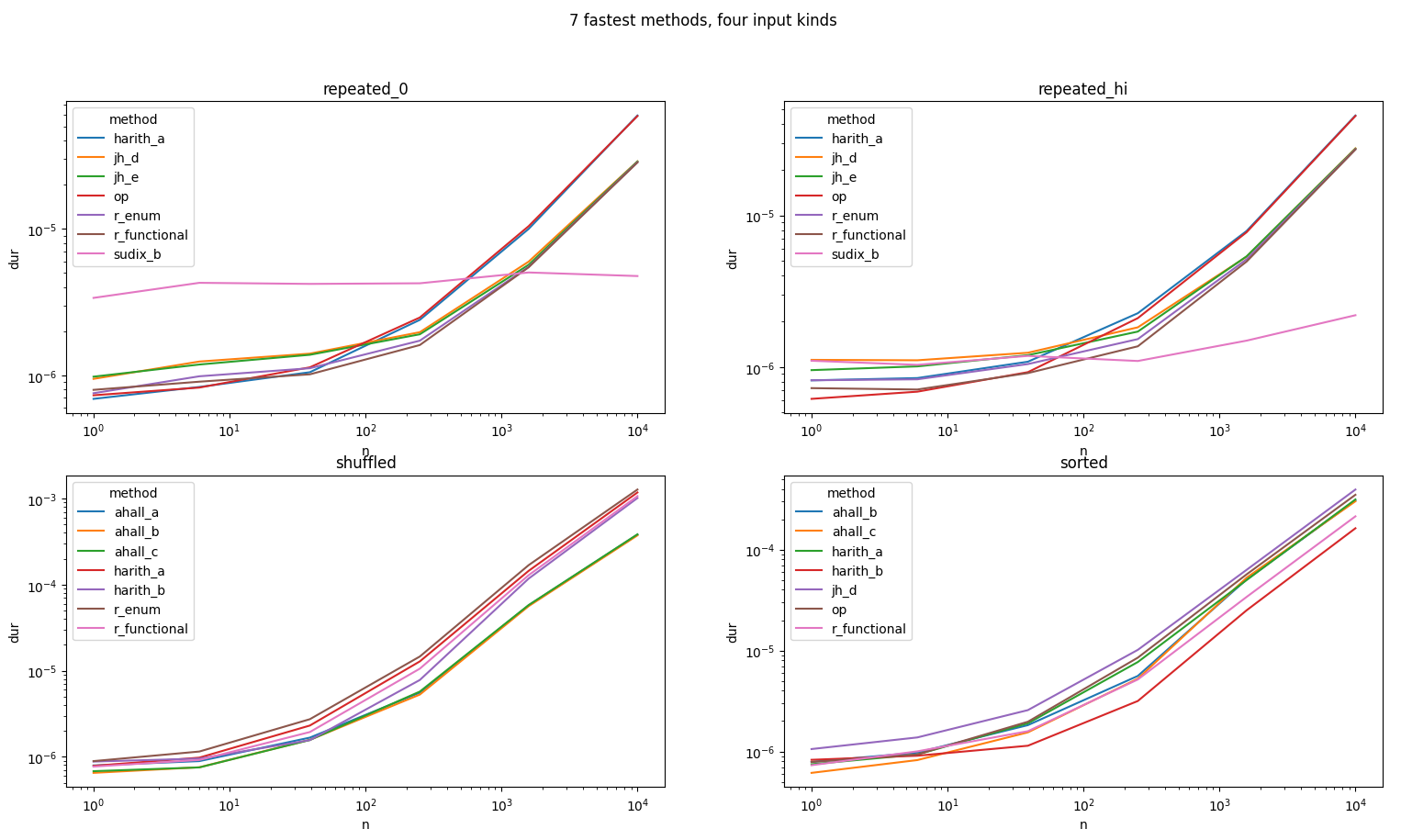As you've seen in many of the other solutions, it's pretty feasible to re-frame your original implementation as a generator, and this increases legibility.
Add unit tests.
I disregard your memory tag and focus on run-time performance. Importantly, there is no one algorithm that will be the best choice for all inputs; the nature of the inputs will significantly change which method is best-suited. For example, for inputs that have out-of-range values, this simple implementation will perform well as it's suited to early-terminate:
def r_enum(arr: list[int]) -> bool:
arr.sort()
return all(
i == x
for i, x in enumerate(arr)
)
(However, your use of sorted - whereas it takes a small performance hit when compared to in-place sorting - is preferable as it reduces side-effects.)
This is equivalent to the marginally faster but more impenetrable
all(
itertools.starmap(operator.eq, enumerate(arr))
)
The above functional approach may be your best choice as an all-around efficient implementation.
To summarise the input-kind effect over all of the methods we've seen so far:
import itertools
import math
import operator
from collections import Counter
from timeit import timeit
from typing import Callable, Any
import matplotlib.pyplot as plt
import numpy as np
import pandas as pd
import seaborn as sns
from matplotlib.axes import Axes
from numpy.random import default_rng
def op(arr):
if len(arr) == 0:
return False
n = len(arr) - 1
i = 0
for x in sorted(arr):
if x != i:
return False
i += 1
return True
def jh_a(arr: list[int]) -> bool:
arr.sort()
return (
len(set(arr)) == len(arr)
and arr[0] == 0
and arr[-1] == len(arr) - 1
and all(isinstance(x, int) for x in arr)
)
def jh_c(arr: list[int]) -> bool:
n = len(arr)
expected_sum = n * (n - 1) / 2
return (
math.prod(filter(lambda x: x > 0, arr)) == factorial(n - 1)
and sum(arr) == expected_sum
and min(arr) == 0
and max(arr) == len(arr) - 1
and all(isinstance(x, int) for x in arr)
)
def factorial(n: int) -> int:
return math.prod(range(1, n + 1))
def jh_d(arr: list[int]) -> bool:
arr.sort()
return all(arr[i] == i for i in range(len(arr)))
def jh_e(arr: list[int]) -> bool:
arr.sort()
return all(isinstance(arr[i], int) and arr[i] == i for i in range(len(arr)))
def r_enum(arr: list[int]) -> bool:
arr.sort()
return all(
i == x
for i, x in enumerate(arr)
)
def r_functional(arr: list[int]) -> bool:
arr.sort()
return all(
itertools.starmap(operator.eq, enumerate(arr))
)
def harith_a(arr: list[int]) -> bool:
if len(arr) == 0:
return False
for i, x in enumerate(sorted(arr)):
if x != i:
return False
return True
def harith_b(arr: list[int]) -> bool:
return False if len(arr) == 0 else sorted(arr) == list(range(len(arr)))
def harith_c(arr: list[int]) -> bool:
return 0 if len(arr) == 0 else Counter(arr) == Counter(range(len(arr)))
def ahall_a(arr: list[int]) -> bool:
return False if len(arr) == 0 else set(arr) == set(range(len(arr)))
def ahall_b(arr: list[int]) -> bool:
return bool(arr) and set(arr) == set(range(len(arr)))
def ahall_c(arr: list[int]) -> bool:
return set(arr) == set(range(len(arr) or 1))
def sudix_b(arr: list[int]) -> bool:
bit_arr = np.zeros(len(arr),dtype=bool)
for x in arr:
if x<0 or x>= len(arr):
return False
if bit_arr[x] == True:
return False
bit_arr[x] = True
return True
METHODS = (
op,
jh_a,
# jh_b, # fails for [0 0 3 3]
jh_c, jh_d, jh_e,
harith_a, harith_b, harith_c,
r_enum, r_functional,
ahall_a, ahall_b, ahall_c,
sudix_b,
)
def test() -> None:
examples = (
# (), # arguably appropriate here, but OP coded the opposite
(0,),
(1, 0, 2),
(2, 1, 0),
(0, 1, 2, 3, 4),
)
counterexamples = (
(1,),
(2, 1),
(1, 2, 3),
(0, 0, 3, 3), # This disqualifies jh_b
(-1, 0, 1, 2),
)
for method in METHODS:
for example in examples:
assert method(list(example)), f'{method.__name__} failed example'
for example in counterexamples:
assert not method(list(example)), f'{method.__name__} failed counterexample'
def benchmark() -> None:
rand = default_rng(seed=0)
def make_shuffle(n: int) -> np.ndarray:
series = np.arange(n)
rand.shuffle(series)
return series
rows = []
kinds = (
('repeated_0', lambda n: np.full(shape=n, fill_value=0)),
('repeated_hi', lambda n: np.full(shape=n, fill_value=n + 1)),
('sorted', lambda n: np.arange(n)),
('shuffled', make_shuffle),
)
for kind, make_input in kinds:
sizes = (10**np.linspace(0, 4, num=6)).astype(int)
def run_all(
rep: int,
n: int,
inputs: np.ndarray,
methods: tuple[Callable, ...],
) -> list[dict[str, Any]]:
result = []
for method in methods:
inputs_list = inputs.tolist()
def run() -> bool:
return method(inputs_list)
result.append({
'n': n,
'kind': kind,
'method': method.__name__,
'rep': rep,
'dur': timeit(stmt=run, number=1),
})
return result
prune_rows = run_all(rep=0, n=sizes[-1], inputs=make_input(sizes[-1]), methods=METHODS)
prune_rows.sort(key=lambda row: row['dur'])
pruned_methods = [
next(
method
for method in METHODS
if method.__name__ == row['method']
)
for row in prune_rows[:len(prune_rows)//2][::-1]
]
for n in sizes:
inputs = make_input(n)
for rep in range(5):
rows.extend(run_all(rep=rep, n=n, inputs=inputs, methods=pruned_methods))
df = pd.DataFrame.from_dict(rows)
df = df.groupby(['n', 'kind', 'method'])['dur'].min()
fig, axes = plt.subplots(nrows=2, ncols=2)
fig.suptitle(f'{len(METHODS)//2} fastest methods, four input kinds')
axes = [ax for row in axes for ax in row]
for kind, ax in zip(df.index.unique('kind'), axes):
ax: Axes
ax.set_xscale('log')
ax.set_yscale('log')
ax.set_title(kind)
sns.lineplot(
ax=ax,
data=df[(slice(None), kind, slice(None))].reset_index(),
x='n', y='dur', hue='method',
)
plt.show()
if __name__ == '__main__':
test()
benchmark()



i, try to swap the value at indexiinto positiona[i]. If the array contains the elements0...(n-1)this will just work. If it contains any duplicates or out-of-bounds elements, you can detect this when doing the swap. Honestly, problems like this are poorly suited for this site. The answer is less about writing good code and more about figuring out a neat trick. \$\endgroup\$arris mutable as the OP presented it. I don't see any constraints on modifying the input in the question. Users might not like you permuting their input... but that's okay because it's a made up algorithms question and there aren't any real users! \$\endgroup\$arris immutable, e.g. atupleorbytes. In fact it even works withrange, which only uses constant space. So to guarantee that you can modify the input you'd have to start witharr = list(arr). \$\endgroup\$